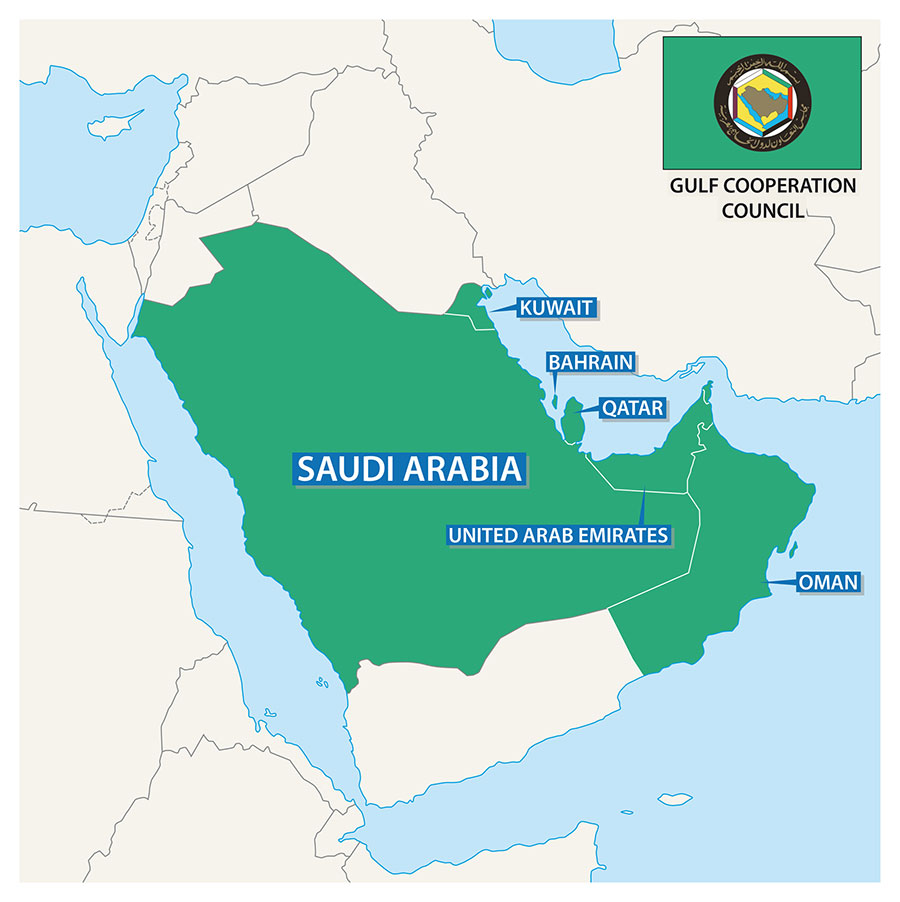China Looking For Free Trade Agreement With Gulf Cooperation Council
Significant breakthroughs expected in trade, infrastructure and RMB internationalization. China has been the largest export market for GCC countries since 2012 and is the main oil and commercial partner to the GCC. China has upgraded relations with all of them to ‘strategic economic partnerships’ and all have joined the Belt and Road Initiative.
China is currently hosting the foreign ministers from major oil producers and exporters in the Middle East to discuss boosting energy ties and a possible free trade agreement. Beijing’s concerns with the unrest in central Asian oil producer Kazakhstan are also being discussed.
Kazakhstan’s largest oilfield, at Tengiz, is operated by the US MNC Chevron, who said on Sunday that production at the oilfield was gradually being restored to its usual volumes, following several days of curtailed output amid logistics disruptions due to contractors supporting the protests. Tengizchevroil, the joint venture pumping oil at Tengiz, produces around 700,000 barrels per day (bpd) out of Kazakhstan’s total crude oil production of some 1.6 million bpd.
The unrest has raised concerns over the energy security of China, which has heavily invested in Kazakhstan’s energy industry.
China is meeting the foreign ministers of Saudi Arabia, Kuwait, Oman, and Bahrain, and the secretary general of the Gulf Cooperation Council (GCC), Nayef bin Falah Al-Hajraf. The Gulf countries and China will be seeking to progress negotiations over a free trade agreement (FTA) and cooperation in areas including energy. The GCC includes Bahrain, Kuwait, Oman, Qatar, Saudi Arabia, and the United Arab Emirates (UAE).
Li Shaoxian, director of the China Institute for Arab Studies at Ningxia University has stated that “The visit is vitally important, and it may lead to positive results for a China-GCC FTA, after negotiations started in 2004.”
GCC’s secretary general Al-Hajraf has stated in pre-meeting notes that the visit will help strengthen GCC-Chinese relations and economic, investment and technical cooperation.
To date, China and the GCC have held five rounds of negotiations and have reached agreement on the majority of issues concerning trade in goods, with the concentration being on energy related products, although not exclusively, meaning there is room for other products as well, and especially in agriculture, fruits, spices and construction materials. Negotiations on trade in services have also been launched.

China has been the largest export market for GCC countries since 2012 and is the main oil and commercial partner to the GCC. China has upgraded relations with all of them to ‘strategic economic partnerships’ and all have joined the Belt and Road Initiative.
According to the US Department of Commerce, by 2030, China will import almost 80% of its oil needs, while by 2019, Saudi oil exports to China increased to 47%, replacing Russia as the largest oil exporter to China.
The GCC countries’ financial weight, which owns sovereign wealth funds estimated at more than US$2 trillion, also plays an essential role to support China’s international financial systems. For example, the GCC countries are founding members in the AIIB. This has allowed China to increase its financial foothold in the Gulf through Chinese banks. For example, in 2018, the Industrial and Commercial Bank of China (ICBC) listed US$1.4 billion through two bonds on Nasdaq Dubai, which brought the total amount of bonds issued by Chinese banks via the exchange to US$5.4 billion. Also, China’s financial foothold in the Gulf optimizes the RMB as an international currency.
The RMB possesses an advanced status in the GCC foreign exchange markets, and especially in the UAE and Qatar. In 2018, several of Dubai’s banks issued international bonds in RMB.
There are further consolidations. Saudi Arabia, with their 2030 Vision, and Kuwait, with their Vision 2035 as well as Bahrain and Oman’s national development plans are all aligned with Belt and Road Initiative development.
Related Reading
About Us
Chris Devonshire-Ellis is the Chairman of Dezan Shira & Associates. The firm assists British and Foreign Investment into Asia and has 28 offices throughout China, India, the ASEAN nations and Russia. For strategic and business intelligence concerning China’s Belt & Road Initiative please email silkroad@dezshira.com or visit us at www.dezshira.com





